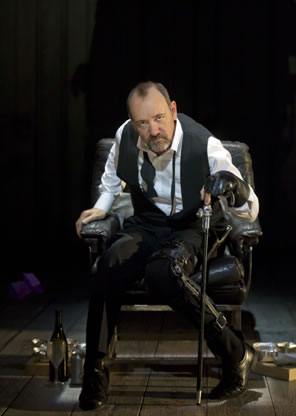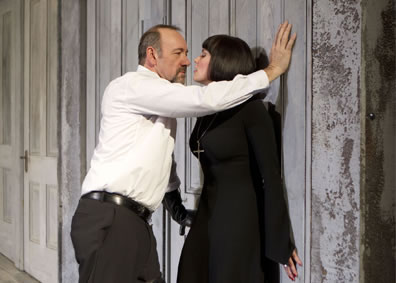Richard III
Spacey Gives a Whiplash-Worthy Portrayal
The Bridge Project (Brooklyn Academy of Music, The Old Vic, and Neal Street), BAM Harvey Theater, Brooklyn, N.Y.
Saturday, February 4, 2012, K-2&4 (right orchestra)
Directed by Sam Mendes

Kevin Spacey as Richard in the open soliloquy of Richard III. Photo by Joan Marcus, Brooklyn Academy of Music.
Buckingham, like a tent revivalist politician, exhorted Richard, Duke of Gloucester, to accept the crown while pumping the citizens (us, aided by cast members placed in the audience) to join in his exhortation. Kevin Spacey as Richard appeared with two “holy men” on a screen above the stage—something like a split-screen newscast of Wolf Blitzer interviewing a politician over his shoulder. Spacey’s Richard played pious here, but when Buckingham, feigning futility, exited with London's Lord Mayor, Richard turned irritated, making demanding gestures even as the mayor and citizens returned. Realizing he was caught projecting something other than the humble holy leader, Spacey’s Richard slipped back into the political character proper for his immediate purpose as if we had never seen what we had just seen.
If that moment sounds like it could be depicting yet another pants-down, You-Tube-viral blunder in the current campaign for U.S. president (or reflecting the image-centric hypocrisy so rife in those campaigns, for that matter), director Sam Mendes has hit his mark with this production of Richard III, which opened in London last summer. But that moment was also notable for being the highlight of Spacey’s performance of the titular Richard in this BAM presentation; ironically, it came when he was on a screen, not on stage, and the camera was tight on his face, not showing his overly deformed body.
As this scene with the London mayor and citizens illustrated, when his Richard was playing somebody else—a Spacey specialty if there ever was one—the actor brought all his talents to the table to present the multiple characters operating in one man. But when his Richard was Richard, Spacey relied on a turned-leg limp, crooked arm, a mountain of a hump, and as much mugging as he could muster to gather up every caricature of the character you’ve ever seen, heard, or perhaps thought up as his performance matrix. From whooping and dancing at the incredulity of a woman so wooed and won to screaming epithets of self-loathing, it was an energetic performance, and one the audience loved to the point of a two-curtain-call-long standing ovation. Certainly it was entertaining theater. But for all that, it was shallow Shakespeare, a performance that was more an impression of Richard than a living, breathing villain.
However, in this modern-dress, modern-time, wink-at-political-image-gamesmanship production, Spacey’s characterization may have even been thematically apt. He gave the audience a Richard we have grown accustomed to seeing (cane or crutch, check; nervous tics, check; Idi Amin uniform, check) while Mendes’ staging either borrowed superfluous ideas we have seen before (coronation scene, check; drugged Anne sitting on the throne in a stupor as Richard plans her death, check) or inserted inconsequential conceptual imagery.
Such was his use of a specter-like Margaret, played by a ragged but voluble Gemma Jones. The banished widow of Henry VI not only appeared in the two scenes Shakespeare gave her—the suggestion in her first scene is that she appeared to the others out of thin air as if a ghost—but she stalked the stage whenever a character was about to be executed. On Tom Piper’s bare set with doors along the walls, Margaret drew a large X on the particular door through which that doomed character would exit, a visual clue that Margaret's curses came true. We get that (after all, Shakespeare clearly makes that point whenever a doomed character speaks his or her last couplet). However, Lady Anne (Annabel Scholey) turning seriously sexual with Richard toward the end of their wooing scene—that I didn't get. This inexplicable reading may have been intended to justify Spacey enacting the most incredulous Richard ever except that he needed no justification for elsewhere playing the most cynical, the most self-consciously devious, and the most self-loathing Richard ever, too.
The play's other queen fared better. Haydn Gwynne's Queen Elizabeth, who had maneuvered through the political landscape with a confidence tempered by caution, did sink into utter despair after Richard was crowned. Her request that Margaret teach her how to curse came from a woman who was now navigating the same kind of nihilistic landscape Margaret had been cast into at the end of her reign in Henry VI, Part Three. However, as Richard descended on her with the proposal that he marry her daughter, Gwynne reached into her character’s innermost despair for the strength to face down the tyrant, growing stronger in fortitude even as Richard grew flustered. When he finally resorted to loud threats (characteristic of this Richard, of course), Gwynne’s Elizabeth showed greater strength in her silent pause before promising to give him answer hereafter, and she left the stage still with a drawn face but prouder in posture. Richard had failed to woo this woman, and it was through the subtle depth of Gwynne’s performance that we got that.
Admittedly, I came into this production somewhat jaded and I stand accused of being the kind of snob I disparage. I had seen the American Shakespeare Center’s production of Richard III at the Blackfriars Playhouse exactly two weeks before, with Benjamin Curns in the titular role. Curns had played Richard in the character’s antecedent plays, Parts Two and Three of Henry VI, the previous two years at the Blackfriars, and his portrayal in Richard IIIbuilt upon the characterization as Shakespeare had been formulating over the course of three plays. Mendes in his program notes acknowledges that playing Richard III in isolation removes the context for many of the characters, but he contends that on its own Richard III becomes "no longer solely about a single monarch, but now about the timeless themes of desire for and abuse of power. A parable." He went on to point out that this production mounted as the Arab Spring unfolded, with Hosni Mubarak or Muammar Gaddafi as mordern Richards. Yet, Spacey's Richard was more kin to Snidely Whiplash.

Richard (Kevin Spacey) wooes Lady Anne (Annabel Scholey) in Richard III. Photo by Joan Marcus, Brooklyn Academy of Music.
Mendes' argument naively assumes that Shakespeare's entire War of the Roses chronicle couldn't be such a parable, nor does he recognize that, even in this one play, the full arc of the characters residing in the text itself gives the parable a richer telling. Curns’ performance at the Blackfriars fastened us to Richard’s dark heart rather than his crooked back (though Curns did have a humped back, twisted leg, and withered arm, too), and yet his Richard was also as endearingly funny in his subtle interchanges with the audience as Spacey managed with his mugging moments. The gap in their performances widened most in their respective depictions of Richard's capacity for evil. One scene best exemplified this comparison. In the Mendes version, Buckingham (Chuk Iwuji) and Richard, at the moment of their falling out, yelled their lines in each other’s faces (typical of this given-to-loudness production), and after Spacey exited, the other characters on stage snickered, the only hint of evil in the air. In the Blackfriars’ version, Buckingham kept chiming like a clock (Richard’s description) in a steady but just-respectful voice; Richard responded with a cobra’s hiss; the audience stiffened. Evil was there, and we felt it in our hair roots.
That one moment—and its impact on the audience (i.e., entertaining theater)—was the difference between an actor assuming a role based on clichés and an actor living a role based on the text. A horse! A horse! I know I’m beating a dead horse, but Shakespearean theater is at its best when you strip away the four-century layers of tradition and play the parts as originally written; somehow when you do, the characters are even more apt for our times. An actor of Spacey’s talent and range would have been far more memorable for all the right reasons if he had embraced that and Mendes’ production would have allowed it. I would he would try it again, even on screen, and give us a Richard for the ages, albeit one specifically attuned to this worrisome age.
Eric Minton
February 10, 2012
Comment: e-mail editorial@shakespeareances.com
Start a discussion in the Bardroom



 Find additional Shakespeareances
Find additional Shakespeareances